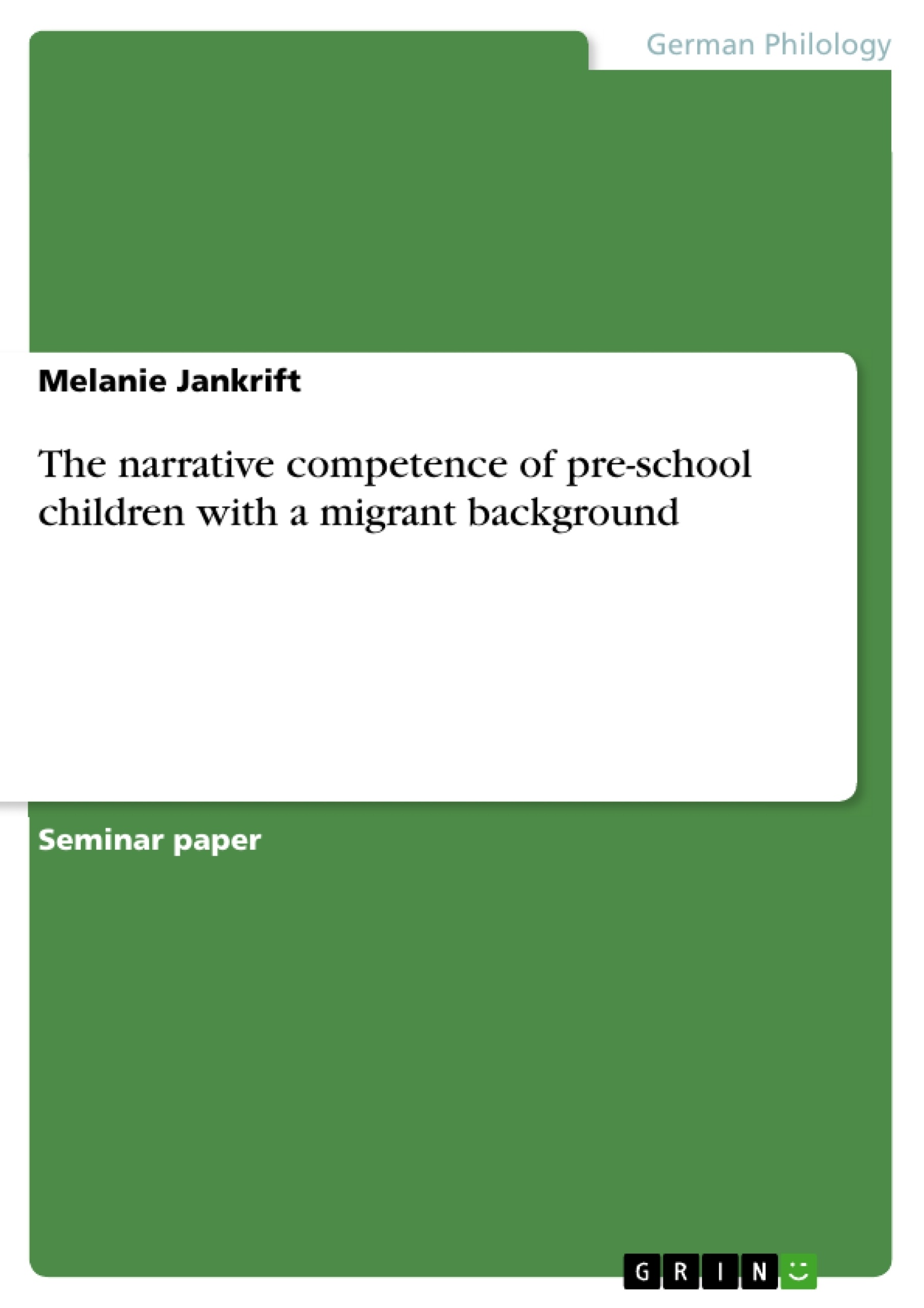The narrative competence of pre-school children marks the transition from orat to literate language productions so that they are an indicator for the pre-literate language skills which are indispensable for educational success in the Western-European countries. The study of Schwabl (2015) which is presented here investigates migrant children’s narrative competence to find out which language structures are the most problematic. The overarching questions of this paper are, what are the main linguistic problems of these bilingual and migrant pre-school children, which are the linguistic structures they lack regarding their pre-literate language skills and how can we develop methods to evaluate these specific skills to support their language progression. No age-based development can be noted due to the high individual linguistic variation between the bilingual children. However, the most meaningful results come from the analysis of the syntactic structures which offer the possibility to categorize the migrant children in to competence profiles.
Inhaltsverzeichnis (Table of Contents)
- Abstract
- Introduction
- Pre-school children and language
- Language acquisition and bilingualism
- Language and migration
- Testing language skills
- Narrations of pre-school children
- Composition of the narrative competence
- Sentence structure and connectivity
- Reference
- Temporal structure
- Narrative structure
- Oral and literate language skills
- Pre-literate language skills and the role of the narration
- Narrative competence of migrant pre-school children
- Material and method
- Narrations of migrant pre-school children
- Sentence structure and connectivity
- Reference
- Temporal structure
- Narrative structure
- Conclusion
- References
Zielsetzung und Themenschwerpunkte (Objectives and Key Themes)
This paper investigates the narrative competence of pre-school children with a migrant background, focusing on the linguistic challenges they face in acquiring the literate register necessary for educational success. The aim is to understand the specific language structures that pose difficulties for these bilingual children and to propose methods for evaluating and supporting their language development.
- The impact of bilingualism on pre-school children's narrative competence.
- Identifying linguistic structures that pose challenges for migrant pre-school children.
- The role of pre-literate language skills in educational success.
- Developing methods to assess and support the language development of bilingual pre-school children.
- The importance of narrative competence as a marker of pre-literate language skills.
Zusammenfassung der Kapitel (Chapter Summaries)
The paper begins with an introduction that highlights the importance of language competence for educational success, particularly for children learning a second language. It emphasizes the challenges faced by migrant pre-school children in acquiring the literate register necessary for academic success, despite often being fluent in everyday language. The introduction then outlines the structure of the paper, outlining the chapters and their contents.
The second chapter provides a comprehensive overview of the linguistic aspects relevant to the study, including language acquisition, bilingualism, and the impact of migration on language learning. This chapter also examines the methods used to test children's language competence and discusses the narrative competence of monolingual pre-school children as a baseline for comparison.
The third chapter delves into the narrative competence of migrant pre-school children, drawing on the findings of Schwabl (2015) and other similar studies. It focuses on analyzing the linguistic structures that present challenges for these children, particularly in terms of sentence structure, connectivity, reference, temporal structure, and narrative structure.
Schlüsselwörter (Keywords)
The key concepts explored in this paper include narrative competence, bilingualism, pre-school children, migration, pre-literate language skills, linguistic structures, and educational success. The paper investigates the specific challenges that migrant pre-school children face in acquiring the literate register necessary for academic success, while also examining the potential for developing methods to support their language development.
Frequently Asked Questions
What is narrative competence in pre-school children?
Narrative competence marks the transition from oral to literate language. It is a key indicator of pre-literate language skills, which are essential for academic success in Western educational systems.
What linguistic problems do migrant pre-school children face?
Research shows that bilingual and migrant children often struggle with complex syntactic structures, sentence connectivity, and maintaining references within a story.
How does bilingualism impact language development?
There is high individual variation among bilingual children. The study suggests that their development isn't always age-based, but rather depends on their specific linguistic environment and exposure to the literate register.
Why are pre-literate skills important for educational success?
Pre-literate skills, like the ability to tell a coherent story, form the foundation for reading and writing. Children who lack these skills often struggle as they progress through the school system.
How can we support the language progression of migrant children?
By developing methods to evaluate specific syntactic and narrative skills, educators can create targeted support to help bilingual children acquire the necessary literate language register.
- Quote paper
- Melanie Jankrift (Author), 2017, The narrative competence of pre-school children with a migrant background, Munich, GRIN Verlag, https://www.grin.com/document/445630



